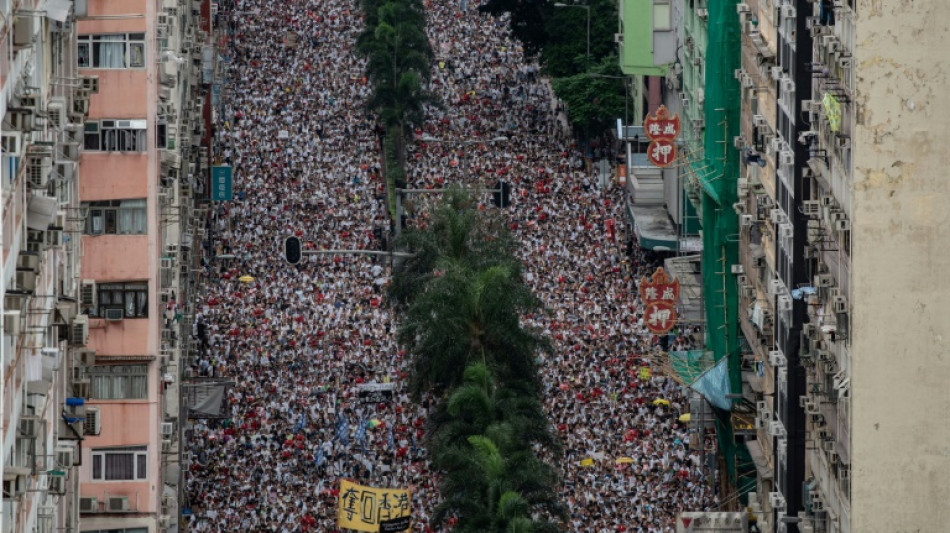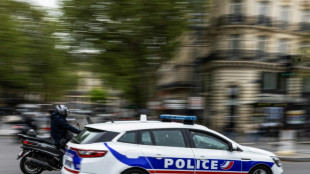
-
 Lillard will try to match record with third NBA 3-Point title
Lillard will try to match record with third NBA 3-Point title
-
Vonn breaks leg as crashes out in brutal end to Olympic dream

-
 Malinin enters the fray as Japan lead USA in Olympics team skating
Malinin enters the fray as Japan lead USA in Olympics team skating
-
Thailand's Anutin readies for coalition talks after election win

-
 Fans arrive for Patriots-Seahawks Super Bowl as politics swirl
Fans arrive for Patriots-Seahawks Super Bowl as politics swirl
-
'Send Help' repeats as N.America box office champ

-
 Japan close gap on USA in Winter Olympics team skating event
Japan close gap on USA in Winter Olympics team skating event
-
Liverpool improvement not reflected in results, says Slot

-
 Japan PM Takaichi basks in election triumph
Japan PM Takaichi basks in election triumph
-
Machado's close ally released in Venezuela

-
 Dimarco helps Inter to eight-point lead in Serie A
Dimarco helps Inter to eight-point lead in Serie A
-
Man City 'needed' to beat Liverpool to keep title race alive: Silva

-
 Czech snowboarder Maderova lands shock Olympic parallel giant slalom win
Czech snowboarder Maderova lands shock Olympic parallel giant slalom win
-
Man City fight back to end Anfield hoodoo and reel in Arsenal

-
 Diaz treble helps Bayern crush Hoffenheim and go six clear
Diaz treble helps Bayern crush Hoffenheim and go six clear
-
US astronaut to take her 3-year-old's cuddly rabbit into space

-
 Israeli president to honour Bondi Beach attack victims on Australia visit
Israeli president to honour Bondi Beach attack victims on Australia visit
-
Apologetic Turkish center Sengun replaces Shai as NBA All-Star

-
 Romania, Argentina leaders invited to Trump 'Board of Peace' meeting
Romania, Argentina leaders invited to Trump 'Board of Peace' meeting
-
Kamindu heroics steer Sri Lanka past Ireland in T20 World Cup

-
 Age just a number for veteran Olympic snowboard champion Karl
Age just a number for veteran Olympic snowboard champion Karl
-
England's Feyi-Waboso out of Scotland Six Nations clash

-
 Thailand's pilot PM lands runaway election win
Thailand's pilot PM lands runaway election win
-
Sarr strikes as Palace end winless run at Brighton

-
 Olympic star Ledecka says athletes ignored in debate over future of snowboard event
Olympic star Ledecka says athletes ignored in debate over future of snowboard event
-
French police arrest six over crypto-linked magistrate kidnapping

-
 Auger-Aliassime retains Montpellier Open crown
Auger-Aliassime retains Montpellier Open crown
-
Lindsey Vonn, skiing's iron lady whose Olympic dream ended in tears

-
 Conservative Thai PM claims election victory
Conservative Thai PM claims election victory
-
Kamindu fireworks rescue Sri Lanka to 163-6 against Ireland

-
 UK PM's top aide quits in scandal over Mandelson links to Epstein
UK PM's top aide quits in scandal over Mandelson links to Epstein
-
Reed continues Gulf romp with victory in Qatar

-
 Conservative Thai PM heading for election victory: projections
Conservative Thai PM heading for election victory: projections
-
Vonn crashes out of Winter Olympics in brutal end to medal dream

-
 Heartache for Olympic downhill champion Johnson after Vonn's crash
Heartache for Olympic downhill champion Johnson after Vonn's crash
-
Takaichi on course for landslide win in Japan election

-
 Wales coach Tandy will avoid 'knee-jerk' reaction to crushing England loss
Wales coach Tandy will avoid 'knee-jerk' reaction to crushing England loss
-
Sanae Takaichi, Japan's triumphant first woman PM

-
 England avoid seismic shock by beating Nepal in last-ball thriller
England avoid seismic shock by beating Nepal in last-ball thriller
-
Karl defends Olympic men's parallel giant slalom crown

-
 Colour and caution as banned kite-flying festival returns to Pakistan
Colour and caution as banned kite-flying festival returns to Pakistan
-
England cling on to beat Nepal in last-ball thriller

-
 UK foreign office to review pay-off to Epstein-linked US envoy
UK foreign office to review pay-off to Epstein-linked US envoy
-
England's Arundell eager to learn from Springbok star Kolbe

-
 Czech snowboard great Ledecka fails in bid for third straight Olympic gold
Czech snowboard great Ledecka fails in bid for third straight Olympic gold
-
Expectation, then stunned silence as Vonn crashes out of Olympics

-
 Storm-battered Portugal votes in presidential election run-off
Storm-battered Portugal votes in presidential election run-off
-
Breezy Johnson wins Olympic downhill gold, Vonn crashes out

-
 Vonn's Olympic dream cut short by downhill crash
Vonn's Olympic dream cut short by downhill crash
-
French police arrest five over crypto-linked magistrate kidnapping


Hong Kong novelists seek freedom in exile after democracy crackdown
When Hong Kong author Kay So left her home city in 2020, she had in her luggage two short stories she had written about the huge, at times violent democracy protests that upended the city in 2019.
It was then three months after Beijing imposed a sweeping national security law on the financial hub to quell political dissent after the protests were quashed.
So knew it would be improbable for her writing project to grow into a book in Hong Kong, so she moved to self-ruled Taiwan to study creative writing.
"I don't want to do creative work in a place... where I have to self-censor. The freedom to write is an important freedom," the 30-year-old told AFP on the phone from Taiwan, where she now lives.
She has since completed a collection of eight short stories written in Chinese that draw inspiration from the protests, entitled "Gazing Into a Fire".
It was published in Taiwan in May -- a month before the fifth anniversary of when a million Hong Kongers took to the streets to oppose a bill to extradite criminal suspects to China's opaque system.
The former British colony -- handed back to China in 1997 -- saw the march morph into a larger movement for more autonomy from Beijing for seven heady months before authorities crushed it.
More than 10,000 people were arrested and over 2,900 prosecuted for participating in the protests.
Since then, protests and anti-government opposition -- which used to make Hong Kong distinct from other Chinese cities -- have all but disappeared, while democracy activists have either been jailed, moved away or muted.
But the movement appears to live on in the pages of several fiction titles published in recent years by Hong Kong authors -- many of them choosing to live and write abroad.
So said her book was dedicated to the democracy movement of 2019, which she called "the most compelling and influential episode" in her life.
"Many people are still serving time in prison or waiting for trial," she said.
"I would like to speak to people who still care... so they would know right here there is a writer who also still cares."
- 'Can't let go' -
Under the Beijing-made security law, media outlets regarded as critical to the government have been prosecuted as "seditious publications", while some independent bookstores -- seen as a leftover bastion of liberal circles -- have faced increased government inspections.
Hong Kong also enacted a second law in March that includes a widened definition of "sedition", which foreign governments like the United States say will curb further freedoms in the city -- effectively silencing an already muted opposition bloc.
But the Hong Kong painted in the pages of So's stories remains in a state of roiling agitation.
A mother tries to send her jailed son his favourite dish; a student struggles with her professor over politics; a daughter writes a letter to her late father accused of being an anti-government suicide bomber.
"I found that I was trapped, I had to keep writing about the movement," So said.
Award-winning novelist Leung Lee-chi, also based in Taiwan, professed the same urgency.
"I can't let go of Hong Kong," she told AFP.
Leung has produced a trilogy since she moved to the island in 2021 -- "Everyday Movement" about those caught in the protests, "Survivor's Notes" exploring what led to the movement, and the latest on the post-protest diaspora titled "The Melancholy of Trees".
"After a political turmoil, literature can help us rediscover ourselves in the sweeping waves," Leung said.
- 'Sustaining the freedom' -
Those who have chosen to continue working creatively in the city must look for "space within its framework", said a Hong Kong-based novelist.
"That's what I believe literature should do," he said, requesting anonymity to avoid repercussions as he has published stories about the 2019 protests.
The memory of the protests remains "a constantly inflamed wound" for many Hong Kongers, he said.
"There is basically no space, no soil for people to discuss, to narrate, to express... but it's not non-existent," he said.
Pointing to the pending court cases against democracy activists and recent arrests under Hong Kong's security laws, he said writing has become his way to connect with people and maintain the spirit of freedom.
"If we persist in... exercising it in our daily life, we are inheriting and sustaining the freedom."
E.Qaddoumi--SF-PST



